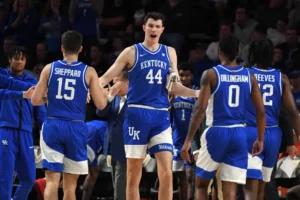Hockey perfectionists may be protesting about the forthcoming Stanley Cup Last since it will have only Sun Belt groups included. It suits Gary Bettman fine and dandy.
Bettman was regarded by the Games Business Diary on Wednesday with a lifetime accomplishment grant for the NHL's development during his 30 years as official, from a business that created $437 million in income before he took more than to almost $6 billion at this point.
Fittingly, it accompanies gathering finalists in Las Vegas, Dallas, South Florida and North Carolina, considering how critical Sun Belt extension and developing the association south of the Canadian line is to Bettman's heritage.
“It's more about the impression: You improve as far as interest at all levels of the game where you have establishments,” Bettman said. “Making a more public impression, both in Canada and in the U.S., is significant for becoming the game.”
The NHL had a presence in only 13 U.S. markets (three in the New York region) in the last full season before Bettman dominated and it wasn't broadcast broadly. Throughout recent many years, that has expanded to 25 American groups in 22 business sectors from one coast to another.
One of the difficulties, Bettman said, was showing to Broadcasting companies that the NHL had “a convincing public story.” This postseason highlights a last four in urban communities that didn't have groups before Bettman landed the position.
The Florida Pumas joined the association in 1993, months after Bettman came over from his post at the NBA, at about similar time the Stars moved from Minnesota to Dallas. Raleigh, North Carolina, got a group later in the last part of the 1990s when the Hartford Whalers turned into the Carolina Storms. What's more, the Vegas Brilliant Knights are just in their 6th time of presence in the wake of turning into the 31st establishment through extension.
In the middle between, groups were included Nashville and Columbus, migrated to Colorado and Arizona, and rebirthed in Minnesota and Winnipeg. En route, Bettman has caused some disruption upset fans in places that lost groups, resting on an example he gained from the late NBA official David Harsh to simply decide, of all shapes and sizes, for the right reasons.
“You get your work done, you settle on as an educated a choice as you can and you don't do it for political reasons on the grounds that political and famous reasons can change at the time,” he said. “You got to do your thought process is correct since, supposing that you're off-base, essentially you did it since you thought it was correct. What's more, that is the manner by which you rest around evening time.”
Bettman favors the expression “more current business sectors” over “contemporary” to portray a significant number of those spots, including Tampa Straight, which has turned into a model establishment and won the Stanley Cup multiple times since joining the association in 1992. He brings up that having groups in new business sectors prompts more arenas being constructed and the game becoming past a portion of the conventional North American hockey hotbeds.
That is part of the way why Bettman is luxuriating in the nature of play, regardless of whether the evaluations during the current year's last probably won't be pretty much as high as a year where stalwart business sectors like Boston, New York, Chicago, Toronto or Los Angeles are involved.
“What's more essential to me is the game: Is it invigorating? Is it engaging? Is it convincing?” Bettman said. “A few business sectors will constantly be greater than others, yet to me it's more about the game and how engaging it is.”







